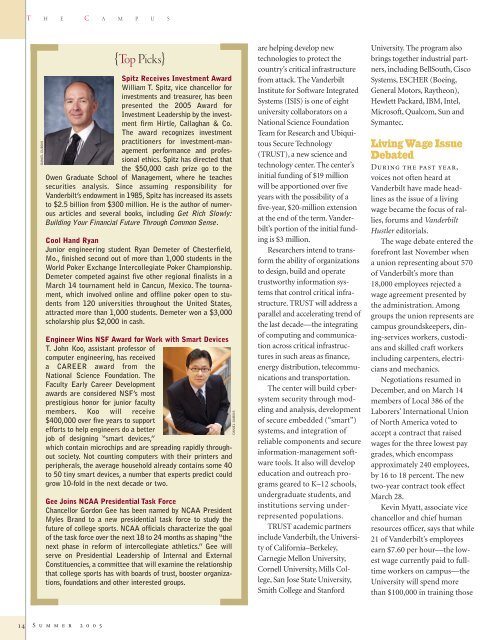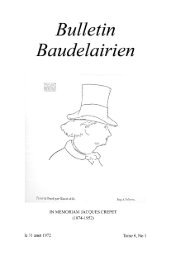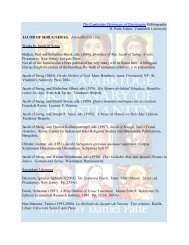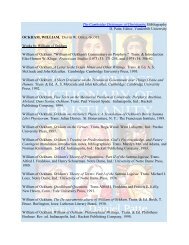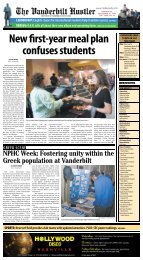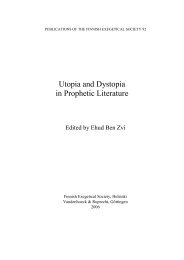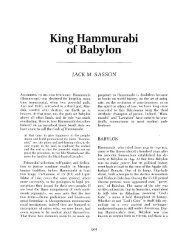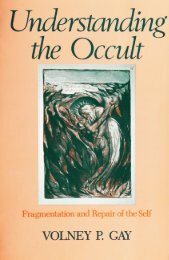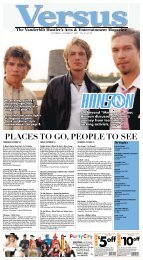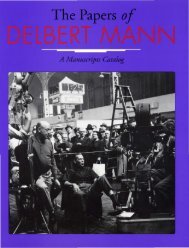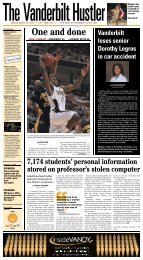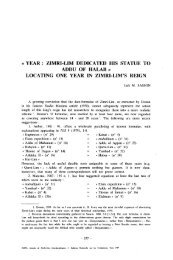From the Editor From the Reader - DiscoverArchive Home ...
From the Editor From the Reader - DiscoverArchive Home ...
From the Editor From the Reader - DiscoverArchive Home ...
You also want an ePaper? Increase the reach of your titles
YUMPU automatically turns print PDFs into web optimized ePapers that Google loves.
14<br />
T H E C A M P U S<br />
DANIEL DUBOIS<br />
S u m m e r 2 0 0 5<br />
{Top Picks}<br />
Spitz Receives Investment Award<br />
William T. Spitz, vice chancellor for<br />
investments and treasurer, has been<br />
presented <strong>the</strong> 2005 Award for<br />
Investment Leadership by <strong>the</strong> investment<br />
firm Hirtle, Callaghan & Co.<br />
The award recognizes investment<br />
practitioners for investment-management<br />
performance and professional<br />
ethics. Spitz has directed that<br />
<strong>the</strong> $50,000 cash prize go to <strong>the</strong><br />
Owen Graduate School of Management, where he teaches<br />
securities analysis. Since assuming responsibility for<br />
Vanderbilt’s endowment in 1985, Spitz has increased its assets<br />
to $2.5 billion from $300 million. He is <strong>the</strong> author of numerous<br />
articles and several books, including Get Rich Slowly:<br />
Building Your Financial Future Through Common Sense.<br />
Cool Hand Ryan<br />
Junior engineering student Ryan Demeter of Chesterfield,<br />
Mo., finished second out of more than 1,000 students in <strong>the</strong><br />
World Poker Exchange Intercollegiate Poker Championship.<br />
Demeter competed against five o<strong>the</strong>r regional finalists in a<br />
March 14 tournament held in Cancun, Mexico. The tournament,<br />
which involved online and offline poker open to students<br />
from 120 universities throughout <strong>the</strong> United States,<br />
attracted more than 1,000 students. Demeter won a $3,000<br />
scholarship plus $2,000 in cash.<br />
Engineer Wins NSF Award for Work with Smart Devices<br />
T. John Koo, assistant professor of<br />
computer engineering, has received<br />
a CAREER award from <strong>the</strong><br />
National Science Foundation. The<br />
Faculty Early Career Development<br />
awards are considered NSF’s most<br />
prestigious honor for junior faculty<br />
members. Koo will receive<br />
$400,000 over five years to support<br />
efforts to help engineers do a better<br />
job of designing “smart devices,”<br />
which contain microchips and are spreading rapidly throughout<br />
society. Not counting computers with <strong>the</strong>ir printers and<br />
peripherals, <strong>the</strong> average household already contains some 40<br />
to 50 tiny smart devices, a number that experts predict could<br />
grow 10-fold in <strong>the</strong> next decade or two.<br />
Gee Joins NCAA Presidential Task Force<br />
Chancellor Gordon Gee has been named by NCAA President<br />
Myles Brand to a new presidential task force to study <strong>the</strong><br />
future of college sports. NCAA officials characterize <strong>the</strong> goal<br />
of <strong>the</strong> task force over <strong>the</strong> next 18 to 24 months as shaping “<strong>the</strong><br />
next phase in reform of intercollegiate athletics.” Gee will<br />
serve on Presidential Leadership of Internal and External<br />
Constituencies, a committee that will examine <strong>the</strong> relationship<br />
that college sports has with boards of trust, booster organizations,<br />
foundations and o<strong>the</strong>r interested groups.<br />
DANIEL DUBOIS<br />
are helping develop new<br />
technologies to protect <strong>the</strong><br />
country’s critical infrastructure<br />
from attack. The Vanderbilt<br />
Institute for Software Integrated<br />
Systems (ISIS) is one of eight<br />
university collaborators on a<br />
National Science Foundation<br />
Team for Research and Ubiquitous<br />
Secure Technology<br />
(TRUST), a new science and<br />
technology center. The center’s<br />
initial funding of $19 million<br />
will be apportioned over five<br />
years with <strong>the</strong> possibility of a<br />
five-year, $20-million extension<br />
at <strong>the</strong> end of <strong>the</strong> term. Vanderbilt’s<br />
portion of <strong>the</strong> initial funding<br />
is $3 million.<br />
Researchers intend to transform<br />
<strong>the</strong> ability of organizations<br />
to design, build and operate<br />
trustworthy information systems<br />
that control critical infrastructure.<br />
TRUST will address a<br />
parallel and accelerating trend of<br />
<strong>the</strong> last decade—<strong>the</strong> integrating<br />
of computing and communication<br />
across critical infrastructures<br />
in such areas as finance,<br />
energy distribution, telecommunications<br />
and transportation.<br />
The center will build cybersystem<br />
security through modeling<br />
and analysis, development<br />
of secure embedded (“smart”)<br />
systems, and integration of<br />
reliable components and secure<br />
information-management software<br />
tools. It also will develop<br />
education and outreach programs<br />
geared to K–12 schools,<br />
undergraduate students, and<br />
institutions serving underrepresented<br />
populations.<br />
TRUST academic partners<br />
include Vanderbilt, <strong>the</strong> University<br />
of California–Berkeley,<br />
Carnegie Mellon University,<br />
Cornell University, Mills College,<br />
San Jose State University,<br />
Smith College and Stanford<br />
University. The program also<br />
brings toge<strong>the</strong>r industrial partners,<br />
including BellSouth, Cisco<br />
Systems, ESCHER (Boeing,<br />
General Motors, Ray<strong>the</strong>on),<br />
Hewlett Packard, IBM, Intel,<br />
Microsoft, Qualcom, Sun and<br />
Symantec.<br />
Living Wage Issue<br />
Debated<br />
During <strong>the</strong> past year,<br />
voices not often heard at<br />
Vanderbilt have made headlines<br />
as <strong>the</strong> issue of a living<br />
wage became <strong>the</strong> focus of rallies,<br />
forums and Vanderbilt<br />
Hustler editorials.<br />
The wage debate entered <strong>the</strong><br />
forefront last November when<br />
a union representing about 570<br />
of Vanderbilt’s more than<br />
18,000 employees rejected a<br />
wage agreement presented by<br />
<strong>the</strong> administration. Among<br />
groups <strong>the</strong> union represents are<br />
campus groundskeepers, dining-services<br />
workers, custodians<br />
and skilled craft workers<br />
including carpenters, electricians<br />
and mechanics.<br />
Negotiations resumed in<br />
December, and on March 14<br />
members of Local 386 of <strong>the</strong><br />
Laborers’ International Union<br />
of North America voted to<br />
accept a contract that raised<br />
wages for <strong>the</strong> three lowest pay<br />
grades, which encompass<br />
approximately 240 employees,<br />
by 16 to 18 percent. The new<br />
two-year contract took effect<br />
March 28.<br />
Kevin Myatt, associate vice<br />
chancellor and chief human<br />
resources officer, says that while<br />
21 of Vanderbilt’s employees<br />
earn $7.60 per hour—<strong>the</strong> lowest<br />
wage currently paid to fulltime<br />
workers on campus—<strong>the</strong><br />
University will spend more<br />
than $100,000 in training those


